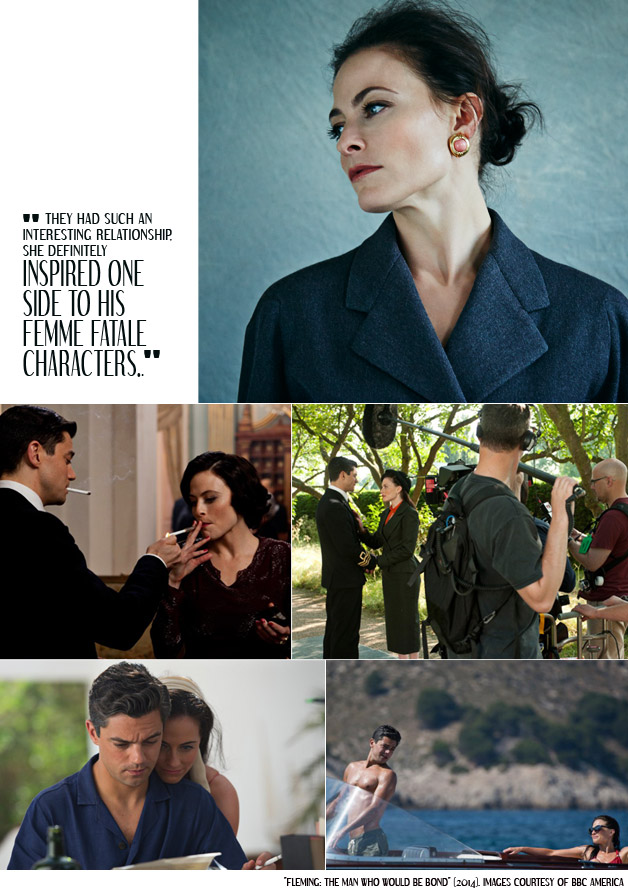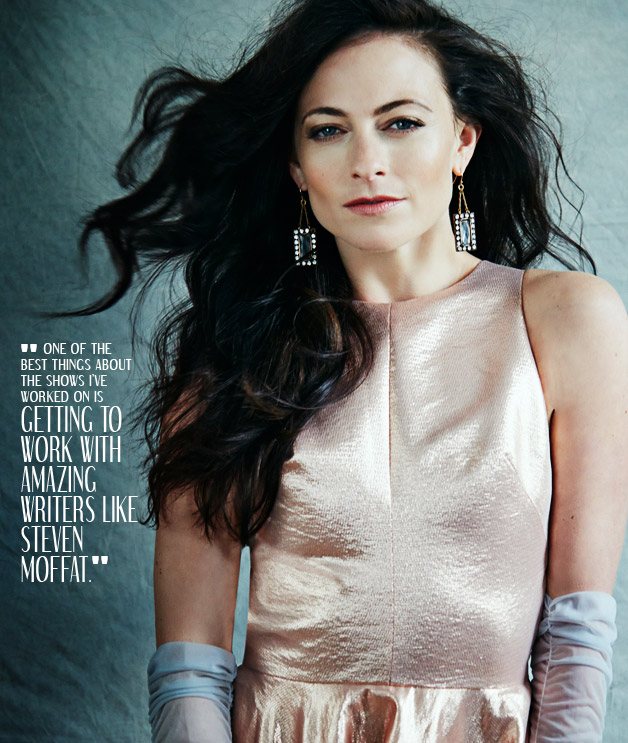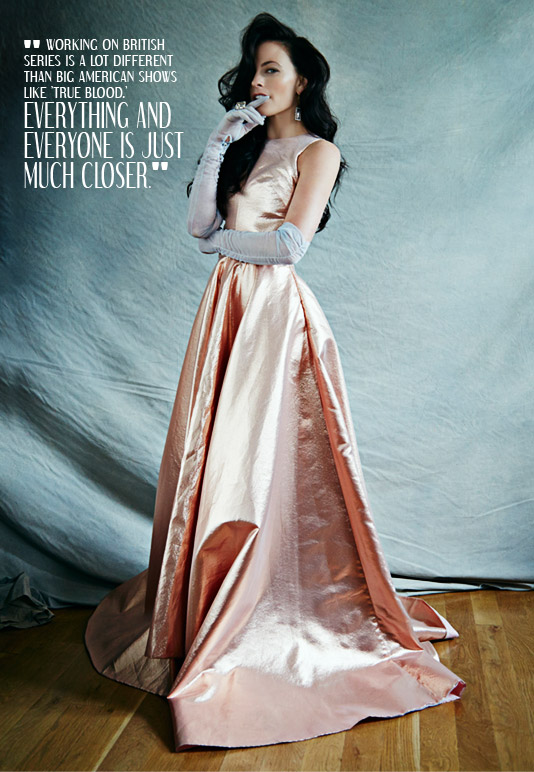There is an enigmatic charm about Bond girls that is impossible to feign — their mystic is iconic, as any who have awed at how actresses Honor Blackman (Goldfinger), Barbara Bach (The Spy Who Loved Me) Halle Berry (Die Another Day) and Eva Green (Casino Royale) inhabit their 007 roles can attest. But before the string of female leads, there was a living, breathing, feeling and fighting, woman — a genuine femme fatale that enraptured the imagination of Bond author, Ian Fleming, and spawned the succession of unforgettable visions of feminine prowess known as Bond girls.
This month, BBC America traces the origins of 007 in Fleming: The Man Who Would Be Bond, which, as audiences learn, hangs as much on Fleming’s romantic relationships, as it does on his time spent working as a British naval intelligence officer during World War II. In terms of the former storyline, it pivots around a single muse: Fleming’s wife, Ann Charteris played by Lara Pulver.
With intellect, seduction and intrigue, Ann sauntered into Fleming’s life. The distinguished wife of Esmond Cecil Harmsworth, Viscount Rothermere (her second husband after Shane Edward Robert O’Neill) with a social circle that included illustrious artists of the time such as Lucian Freud and Francis Bacon, she was more than any other socialite the playboy Fleming has ever encountered. Their affair would eventually see the end of Ann’s marriage to the Viscount and the dawn of Mrs. Fleming, the archetype behind one of literature’s and cinema’s most storied genre of femme fatales.
Fast becoming an old hand at playing the sharp temptress — see her performances in BBC’s Sherlock and HBO’s True Blood — Pulver portrays the woman that would would temp and temper Fleming for the whole of the latter half of his life, with intoxicating finesse.
“I think that the story is so interesting — Ann’s role being one of the most interesting parts about it,” says Pulver.
In the role of Ann, the 33-year-old actress helms the highs and lows of a tumultuous romance brilliantly opposite Dominic Cooper, who charmingly plays Fleming. With delicacy, the actress, illuminates the complexity of her character, who is shown as a creature of the flesh, but one with a strong character, mind and will, much like the women that would become players in the life of Fleming’s Bond. And like the best of the Bond girls, there is more to the beautiful Mrs. Fleming than meets the eye.

That said, what meets the eye is — in true Bond fashion — a sight to behold. “She’s definitely a lady that would never leave the house less than perfect. It’s part of her power,” explains Pulver. “It was fun to wear all the beautiful costumes…they definitely were high maintenance though. It’s not something that I would wear in my everyday life, I like to keep it much more simple.”
To stir up anticipation for this evening’s series premiere on BBC America, we take a moment to talk to Pulver about playing the original Bond girl and the appeal of taking on the challenge of strong female leads.

Much of the miniseries focuses on your character’s — Ann — relationship with author, Ian Fleming. How would you describe Ann’s feeling towards Ian?
There was definitely a certain sense of bravado between the two of them. I think it’s interesting that they met during wartime; it really was part of their relationship.
It’s true, it’s apparent in their state of mind almost. What were you most surprised about when it came to Ann?
I was surprised that she didn’t like his work.
Is that true, really?
They had such an interesting relationship…she definitely inspired one side to his femme fatale characters, but during the series, you see that she wasn’t completely into his writing.

How so?
She kind of thought it was vulgar. This is all part of their relationship though, deep down she must have liked it on some level…
You and Dominic Cooper share wonderful on-screen chemistry. How was it working opposite him on the show?
Dominic was great; he’s so charming, especially in the role. He really takes on Fleming’s idea of himself. There were a few scenes that were very heated and there was a level of improv between us. It was important to show how much they liked each other while still showing how awful they were to one another.
How has it been being a part of the story of James Bond? It’s one that everyone knows so well.
It’s just one of those stories that’s a part of British heritage…that everyone knows. But I think this story is interesting because not everyone knows it. Where the ideas came from and how Bond was so much based on Ian’s life.

It was a very complex relationship to say the least.
Their relationship was so dysfunctional, and yet on some level it worked.
You’ve taken on some very memorable strong female roles, including Irene Adler in Sherlock. What draws you to these women?
These are exciting femme fatale roles, where the woman character is wonderfully complex. I think there should be more roles like this out there. I had such positive feedback as to the strength and intrigue of the character.
Between Sherlock, True Blood and now Fleming, you’ve been involved in some great television series recently. Is there anything particular you’ve taken away from these experiences?
One of the best things about the shows I’ve worked on is getting to work with amazing writers such as Steven Moffat. It’s just so amazing to see them work.
Do you find much difference between working on American productions and British ones?
Working on British series is a lot different than big American shows like True Blood. Everything and everyone is just much closer.
What’s next for you? Any more iconic British female roles for you in the future?
My next project is actually a Tom Cruise film Edge of Tomorrow. It was so amazing to get to work with him, he was so completely professional. I love doing British roles, but I would like to do more big budget stuff like that.
Lara Pulver stars in BBC America’s “Fleming: The Man Who Would Be Bond“, airing January 29th, 2014.
Published January 29, 2014










